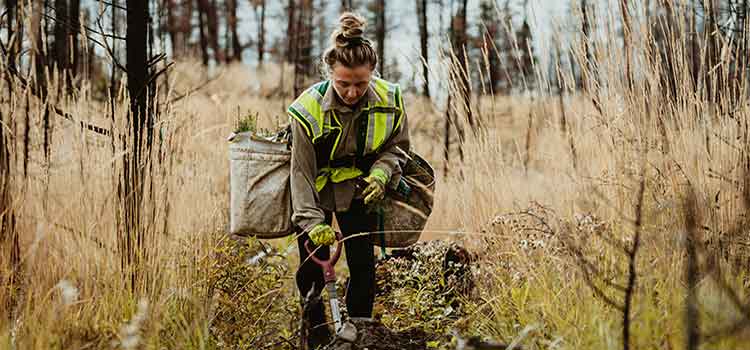In this Article
How To Become a Game Warden (Requirements, Duties & Salary)

You might ask yourself what qualities or characteristics are important to becoming a good game warden? Those with a keen work ethic and passion for the natural environment and its resources are great candidates. Good judgment and a sound moral character are also beneficial when choosing to pursue a career as a game warden.
Those characteristics are not all that is needed, though. An array of basic standards and a strong educational foundation are required when pursuing this career.
What is a fish and game warden?
Fish and game wardens, commonly called conservation officers, protect the natural resources of their jurisdiction. They enforce laws directly, educate the public and perform search and rescue missions when needed.
How to become a game warden in 4 steps
Fulfill the basic game warden requirements.

Basic requirements to become a game warden vary by state, however, common prerequisites across the U.S. include:
→ Minimum age of 21
→ U.S. citizen and valid drivers license
→ A high school diploma or GED
→ Pass a background check
→ Pass a basic medical examination
→ Pass a polygraph examination
→ Complete the Physical Readiness Test (PRT)
→ Complete the Police Officer Selection Test (POST)
It is important to understand the basic requirements of the jurisdiction that you may want to work in. Game warden candidates can save time and money by properly researching their territory’s job requirements before pursuing the career. You can find your local requirements by checking on your city, state or county’s website or by contacting the agency directly.
Typically, each state has an organization such as a parks and wildlife commission, game and fish commission, or similar agency that will list the exact requirements on their website. If further questions are needed regarding your jurisdictions requirements, feel free to call or email one of these associated agencies
Earn your degree.

Most states require candidates to earn an associate or bachelor’s degree before applying. Most game warden applicants pursue their degree in field of study relating to law enforcement or sciences. Criminal Justice is an extremely common major chosen for many future game warden applicants. However, earning your degree in natural sciences can also be a great choice.
While many states don’t require a college education, many candidates report that achieving a higher degree has helped them stand-out within a competitive job market.
Complete academy and field game warden training.

Most states require aspiring game warden to attend an academy, where applicants are trained in biology, law and the associated sciences of their jurisdiction. These academies can last anywhere from three to 12 months. After graduating from your state’s game warden academy, some states require applicants to complete a set amount of field training hours. Each state has a subjective amount of field training hours required to be completed by candidates. It will benefit those seeking out this career to research their local agencies required amount of field training hours, in order to anticipate how much additional time they will spend training after academy graduation.
Pass the required exams.

Once a candidate graduates from their state’s academy, and completes the required field training, they must pass a generalized exam, medical exam and complete firearm training. Applicants who fail any of these exams could be barred from re-applying for up to 12 months.
Typical candidates will receive an offer of employment. However, many states may hire their game earned on a first year probationary period. This first year will end with performance review gauging the new game wardens quality of work.
Therefore, it’s important to retain much of the information studied for during your initial game warden exams, as it is vital to future job security.
Game warden requirements (the bare minimum)
Minimum Age: In most states, you must be at least 21 years old.
Physical Capabilities: The basic daily duties of a fish or game warden include myriad physically demanding tasks. For example, daily responsibilities include hiking over difficult terrain, extensive swimming, apprehending criminals as well as operating a variety of different vehicles efficiently. Also, some states require a fitness example. Each state has different requirements for their physical fitness exams. For example, you may be required to run two miles in an adequate time to receive state approval and pass the mandated physical requirements.
Exams: Each state has a required game-warden exam. These exams consist of questions relating to both state and federal law, environmental sciences, geography, biology, environmental skills and writing skills.
Before becoming a game warden, you will be interviewed extensively and need to pass psychological and physical exams, take a urinalysis to screen for illegal drug use and pass a thorough background check. Additionally, select states will only hire present police officers for game warden positions.
Some basic fundamental steps that help you develop the skills needed to become a game warden include:
Education and schools
Beyond training academies, there are no specific schools for game wardens. However, obtaining your associate or bachelor’s degree in criminal justice could help you meet the educational standards of the job. Many online, accredited schools offer the educational foundation you need to become a game warden.
Some states have game warden academies that candidates attend for basic training. The length of academy training varies from state to state. Although differences do exist from state academy to state academy, there is significant subject matter overlap. Common areas of study include:
- Boat operations and water rescue
- Defensive tactics
- Driver training
- First aid
- Fish, wildlife, and natural resource management
- Homeland security
- Law enforcement
- Physical training
- Use of firearms
Some states also require field training upon completing an academy, providing candidates with further hands-on experience.
Degrees
Although there are various game warden academies in certain states, and a federal game warden academy in Glynco, GA, it is important to complete basic educational requirements first.
Every state has different standards, yet many require game wardens to have an associate or bachelor’s degree from an accredited college or university. Some states require candidates to complete their degree in particular fields of study such as criminal justice or within the natural sciences.
Every state has different standards, yet many require game wardens to have an associate or bachelor’s degree from an accredited college or university.
Others may also choose to study public policy, criminal justice administration or emergency and disaster management, if they aspire to climb the chain of command. Regardless of your major, many states still require candidates to complete a number of classes in wildlife and biology.
“It’s always good to get that four year or associate’s degree,” said Capt. Sean Green of the Lafayette, LA Wildlife and Fisheries Department. “We (Louisiana Wildlife and Fisheries Department) do not require a four year degree currently. Yet, we do require 60 hours of college credit, pretty much the same amount of study or equivalent to an associates degree.”
Additionally, some agencies may offer promotional or financial incentives to receive graduate degrees.
“Pursuing your master’s degree, for some officers, can help you achieve up to a 10% increase in your salary,” said Green.
Certifications
Aside from passing basic medical exams and an extensive background check, game wardens are required to earn a firearms certification. This certification requires that candidates pass a firearms handling and shooting exam. Candidates may also be required to obtain various motor vehicle licenses. For instance, if your agency utilizes trucks and boats regularly, you will be required to earn the appropriate driving licenses and endorsements.
What does a game warden do?
A game warden’s primary duty is to enforce various environmental laws. That’s why game wardens are expected to know so much about hunting, fishing, wildlife regulations, camping and other outdoor activities.
Some game wardens start their days well before sunrise, helping biologists study wildlife or fisheries. This research helps establish dates and “bag limits” (seasonal hunting or fishing restrictions). Wardens then check licenses and enforce hunting and fishing bag limits.
In addition to directly enforcing environmental laws, game wardens have many other duties that involve daily public interaction. Game wardens visit sportsmen clubs, schools, scout and civic groups and speak about hunting and fishing regulations. They also help teach hunting and fishing courses.
Other duties could involve visiting landowners to encourage anglers or hunters to hunt and fish on their property for excess or imbalanced wildlife. They also monitor and regulate poaching and excessive hunting. Catching poachers requires specialized techniques and tactics, and this is the “detective” side of game-warden work.
Fish and game warden salary
How much do they earn and are they in demand? There are approximately 6,290 fish and game wardens, according to the U.S. Bureau of Labor Statistics (BLS). Fish and game wardens earn a median annual salary of $60,380. The BLS projects game warden employment will decline -6.3% through 2032, slower than the national average of 3% growth for all occupations.
Ever wonder which states have the highest number of game wardens? According to the BLS, the top five states are:
| State | Employment |
|---|---|
| Florida | 680 |
| Texas | 490 |
| New York | 380 |
| Tennessee | 350 |
| California | 290 |
Regardless of which state you want to work in, if your goal is to protect the environment and our wildlife then becoming a game warden is an ideal career. The best first step to achieving that goal is by completing the required educational requirements.
Game warden job FAQs
What is a typical day for a game warden?
Many game wardens may not have the luxury of working the traditional 9 to 5 hours. Maintaining laws relative to wildlife and the ecosystem require a twenty-four hour focus. Therefore, shifts for many law enforcement agents including game wardens, can be sporadically scheduled with long hours.
The everyday life of a game warden includes arresting and apprehending criminals, upkeep of environmental education for the public, and continuous patrolling of your jurisdiction. Patrolling includes enforcing hunting and fishing licenses and limits. For example, if someone has over-fished a protected species, they may be ticketed, fined and even arrested by a game warden.
What are the duties of a game warden?
Game wardens are responsible for enforcing ecological laws protecting hunting and fishing wildlife. Duties will include investigating hunting and fishing violations, compiling evidence for legal prosecution, issuing hunting and fishing licenses, as well as enforcing various boating and recreational laws.
Are game wardens important for the environment?
Game wardens are vital to protecting and stabilizing the environment and its inhabitants.
“Game wardens in the US play an important role in issuing permits for hunting and fishing. Funds from this are the major way we pay for many of our natural areas at the state level. Wardens also help enforce laws and regulations that protect wildlife and also are involved in or help with organization of educational programs. We need folks to follow regulations, but with respect to environmental awareness the education component is critical. People have to learn about the importance of the natural world in order to support protecting it,” said Dr. Lisa Morano, Director of the Center for Urban Agriculture and Sustainability and Professor of Biology and Microbiology at the University of Houston–Downtown.
Where do game wardens get paid the most?
As of 2021 the U.S. Bureau of Labor Statistics’ (BLS) Occupational Outlook Handbook reports the national median salary of a game warden as $60,380. Yet, it is important to recognize that the median salary of a game warden can vary greatly depending on the state of employment. For example, the BLS reported a $61,130 median salary for game wardens in the state of Georgia and a $78,330 median salary for game wardens in Illinois. Due to the large range in median salary and overall requirements, it may be of value to research which state suits your needs best before pursuing a game warden career.
How can a game warden increase their salary throughout their career?
The most likely way of increasing your salary as a game warden is through the pathway of promotion.
“Taking upon extra duties, assisting your agency when needed, is a pathway to getting promoted. Whether you are a Senior Agent, Corporal, or Sergeant, promotion is the most likely way to increase your salary,” said Green.
Some agencies may offer financial incentives for achieving your master’s or higher secondary degrees. For example, certain agencies around the nation may offer up to 10% increase in salary once you have completed a secondary degree in an applicable field of study such as criminal justice. It is important to call your local agency, or speak directly with your jurisdictions recruiter, to confirm any potential salary incentives tied to achieving a higher degree.
The promotional pathway to success highlights the importance of a good work ethic and deep knowledge of your jurisdiction’s wildlife and environment. These qualities are just some of many that every successful game warden should possess.


